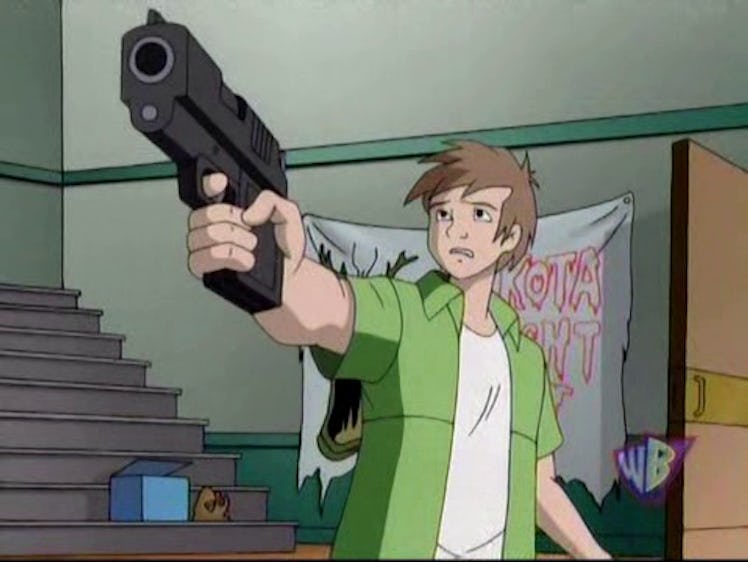‘Static Shock’ Was the Only Cartoon to Talk Honestly About Gun Violence
In "Jimmy," there is no villain-of-the-week or neat ending. Just painful confusion and moral ambiguity.

“Very special episodes,” a mainstay of nineties children’s television programming, tended to be preachy and eager to offer simple solution to convoluted problems. Not only were many of these shows unwatchably stilted, many bordered on surreal. The prime example might be Jessie Spano’s infamous caffeine pill freak-out in Saved by the Bell, when a popular main character inexplicably gets hooked on over-the-counter supplements and suffers a sobbing, over-the-top breakdown. But just because a genre tends to fall flat doesn’t mean one example can’t stick the landing. And that’s precisely what Static Shock’s special gun violence episode “Jimmy” did on May 4, 2002. The episode is an unflinching take on bullying and the frequent moral ambiguity of retaliation.
Static Shock ran from 2000 to 2004 on Kids’ WB, the children’s programming block of the former WB Network. Based on a DC comics character Static, the show followed high-schooler Virgil Hawkins, a black teen who develops electricity-based superpowers and takes on a superhero persona. The show followed a standard superhero serial format. Static thwarted bank robberies, took on mad scientists, chased down the bad-guy-of-the-week. But shortly after the show hit the air, it’s creators got ambitious. The show, which was ahead of its time on the representation front, started weaving social issues into its weekly plots. In one episode, Virgil visited his best friend’s house, inciting his friend’s father to go on a racist tirade. In another, a character with dyslexia worried that his disability would hold him back.
The show could certainly be accused of being politically correct, as shows speaking to multiple cultures frequently were and still are, but it tended to prioritize plot. It cared about issues, but didn’t have a particularly overt agenda.
This approach worked and “Jimmy” represents the show’s high water mark. The plot of “Jimmy” seems somewhat straightforward at first: Virgil and his friend Richie befriend a bullied outcast from their school, Jimmy. Jimmy comes off as an archetypical loner who prefers to spend time on his laptop instead of talking to others, and it certainly doesn’t help that he’s relentlessly tormented by the school’s pack of bullies. Virgil and Richie decide to hang out with Jimmy after school. After all, no one else will, and you sense that the episode will probably offer some moral on befriending others, and that any minute the super-villain of the week will show up to make things more exciting.
Except a super-villain never arrives. Instead, while hanging out, Jimmy makes a cryptic comment about having access to his dad’s handgun. While Virgil and Richie walk away feeling concerned, they’re not overly-alarmed, but they do regret their inaction. Then, during preparations for a school dance, Jimmy pulls his dad’s gun on his meanest bully. As students try to wrestle the weapon away from Jimmy, it goes off, hitting Richie in the leg.
The fallout is swift (it would have to be with a 20-minute run time) and emotionally chaotic. Jimmy is sent to a juvenile detention center. The bullies are suspended from school and forced to do community service. With his leg in a cast, Richie returns to his normal joviality, but knows just how lucky he is that things didn’t end worse. He seems aware on some level that he is responsible for his own misfortune. Virgil and everyone else present at the shooting undergo counseling.
The bad guy of the week turns out to be what could have happened. Death waits in the wings.
And that’s it. No triumphant ending. No neat ribbon. When a gun appears in a children’s show that’s normally about superheroes, the world doesn’t follow the comic formula anymore. Violence isn’t clean or simple, and Static Shock refused to shy away from an adult, basic truth like that.
In the end, Virgil expresses how confused he is on how to feel about the outcome. He’s furious at Jimmy for shooting his friend, but he’s not sure that Jimmy deserves to go to jail for it. To what degree was Jimmy also a victim? And to what degree are the bullies, who ultimately weren’t the ones who pulled the trigger, culpable in how things played out?
Static Shock refuses to give answers to any of those questions, because there truly aren’t any. The result is powerful, especially for younger viewers, because there are so many ways to interpret the narrative and there is no good guy or bad guy with a gun. The gun is presented merely as a tool for creating pain. It, like the episode itself, lacks a moral vector or ascribed moral value. It’s just a thing Jimmy’s dad fails to keep safe.
There’s rarely a satisfying response to gun violence. The show demonstrates that. Advertisers probably didn’t love it, but there it is. Life in a well-armed society is like that sometimes.
“Jimmy” shocks viewers out of a familiar formula and forces them to confront the hard to understand sources of real-world destruction. In a universe built on right and wrong, it hardly seems fair that someone innocent and well-intentioned could be hurt by someone he was trying to help.
“Bullets don’t discriminate between friends and enemies,” Virgil’s counselor offers at the episode’s conclusion. “They hurt everyone.”